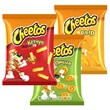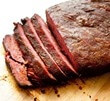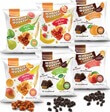Snacks have long been an integral part of our lives. Children and adults alike enjoy crisps, popcorn, pretzels and fruit snacks. However, some of the most popular and delicious snacks have an unappetizing side that producers usually don't inform consumers about.
Here are the top 7 "tasteless" facts about snacks sold in Russian stores.
7. Cheetos trick your brain
 These orange finger-like corn chips are delicious and very old (in terms of when they first went on sale). The classic crispy Cheetos were introduced in 1948 and quickly became one of the best snack brands around.
These orange finger-like corn chips are delicious and very old (in terms of when they first went on sale). The classic crispy Cheetos were introduced in 1948 and quickly became one of the best snack brands around.
These chips have become insanely popular for a reason. According to nutritional scientist Stephen Whiterley, Cheetos are an example of "vanishing calories." Fast food in the mouth tricks the brain into thinking that since there is no food, there are no calories consumed. And if the brain does not think that the body is consuming calories, then it does not send a message to the stomach that you are full. This makes it easy to eat the entire Cheetos pack and go for a new one.
6. Pretzels are bathed in alkali
 # 6 on the list of "unappetizing" fast food stories are warm, soft beer pretzels, which are also perfect for snacks on the run. Do you know what gives pretzels their memorable taste and mouth-watering crust? The answer is simple - it's caustic soda, or caustic soda. The pretzel dough is dipped in a mixture of water and lye before baking. The alkaline bath gives the pretzels an attractive browned color. Otherwise, the pretzels will come out of the oven white. A mixture of hot water and baking soda can also be used as a browning agent, but many bakers find the alkaline method to give the best results. Bakers usually use special food lye, rather than industrial lye.
# 6 on the list of "unappetizing" fast food stories are warm, soft beer pretzels, which are also perfect for snacks on the run. Do you know what gives pretzels their memorable taste and mouth-watering crust? The answer is simple - it's caustic soda, or caustic soda. The pretzel dough is dipped in a mixture of water and lye before baking. The alkaline bath gives the pretzels an attractive browned color. Otherwise, the pretzels will come out of the oven white. A mixture of hot water and baking soda can also be used as a browning agent, but many bakers find the alkaline method to give the best results. Bakers usually use special food lye, rather than industrial lye.
5. Corned beef can cause cancer
 Corned beef is a good choice for those looking for a protein-rich snack. However, the World Health Organization believes that processed meats increase the risk of certain cancers.
Corned beef is a good choice for those looking for a protein-rich snack. However, the World Health Organization believes that processed meats increase the risk of certain cancers.
About 34,000 annual cancer-related deaths (worldwide) are attributable to a diet high in processed meat. Perhaps this is due to the fact that carcinogens are formed in meat during heat treatment.
4. There is more to gummies than sugar and spices.
 Gummy bears, snakes and other sweets are some of the favorite snacks for children and adults. But there is one unpleasant fact: this product contains residues from the slaughterhouse. Namely, gelatin.
Gummy bears, snakes and other sweets are some of the favorite snacks for children and adults. But there is one unpleasant fact: this product contains residues from the slaughterhouse. Namely, gelatin.
Back in the Middle Ages, people discovered that if you boil animal bones and skins in water, you get a broth that solidifies when cooled. Then the process of making gelatin was very long and took about 6 hours. Only wealthy households with a large number of employees could fulfill this task.
Gelatin is commercially produced all over the world these days.And you don't have to be a wealthy livestock owner to enjoy the gummy, gummy cubs that owe their existence to boiled animal parts.
3. French fries are delicious, but can be dangerous
 French fries (as well as potato chips) cannot be classified as a healthy food, due to the abundance of sodium and fat. But the greatest danger in these products is acrylamide. This chemical causes cancer in laboratory animals. It is absent in raw potatoes and appears after high-temperature cooking.
French fries (as well as potato chips) cannot be classified as a healthy food, due to the abundance of sodium and fat. But the greatest danger in these products is acrylamide. This chemical causes cancer in laboratory animals. It is absent in raw potatoes and appears after high-temperature cooking.
- For example, 120 gr. boiled potatoes contain more than 3 mcg of acrylamide.
- And at 30 gr. Pringles Potato Chips - 25 mcg
- If you take a 180-gram serving of McDonald's fries, it contains 72 mcg of acrylamide.
Frequent consumption of food with acrylamide in women increases the risk of developing ovarian or cervical cancer.
2. Fruit snacks are no healthier than candy
 In second place in the ranking of interesting facts about quick snacks is a product that is positioned as a healthy source of vitamins. Usually, the labels of these snacks say that they are made from real fruits and contain the recommended daily amount of vitamin C.
In second place in the ranking of interesting facts about quick snacks is a product that is positioned as a healthy source of vitamins. Usually, the labels of these snacks say that they are made from real fruits and contain the recommended daily amount of vitamin C.
However, the health benefits of a fruit bar cannot be compared to real strawberries or bananas. While fruit snacks are nutritious, they have more in common with candy than real fruit. They are low in dietary fiber that fresh fruits are rich in.
Some snacks contain the sweetener maltitol, which has a laxative effect (with a caveat - in large doses).
1. Popcorn can cause lung disease
 Popcorn is one of the oldest and most famous snacks. According to archaeologists, it was enjoyed by the inhabitants of South America (namely, Peru) 6700 years ago. Then popcorn was cooked on hot coals, or held over an open fire. In the modern world, the microwave perfectly copes with this task. Anyone who has ever put a packet of popcorn in the microwave will know the characteristic smell of this snack. But the oily flavor that gives popcorn such a delicious flavor contains chemicals and dangerous food additives - trans fats. If inhaled, they can damage the lungs. Workers in popcorn factories often suffered from "popcorn lungs" due to regular exposure to chemical fumes. The disease damaged the bronchioles and they became narrower, which made it harder for a person to breathe.
Popcorn is one of the oldest and most famous snacks. According to archaeologists, it was enjoyed by the inhabitants of South America (namely, Peru) 6700 years ago. Then popcorn was cooked on hot coals, or held over an open fire. In the modern world, the microwave perfectly copes with this task. Anyone who has ever put a packet of popcorn in the microwave will know the characteristic smell of this snack. But the oily flavor that gives popcorn such a delicious flavor contains chemicals and dangerous food additives - trans fats. If inhaled, they can damage the lungs. Workers in popcorn factories often suffered from "popcorn lungs" due to regular exposure to chemical fumes. The disease damaged the bronchioles and they became narrower, which made it harder for a person to breathe.
But it's not just popcorn workers who are at risk. Colorado-based consumer Wayne Watson developed lung popcorn after eating two packs of popcorn daily for ten years. As a true American who does not tolerate injustice, Watson decided to sue the popcorn manufacturer and seller and received $ 7 million in compensation from them.

